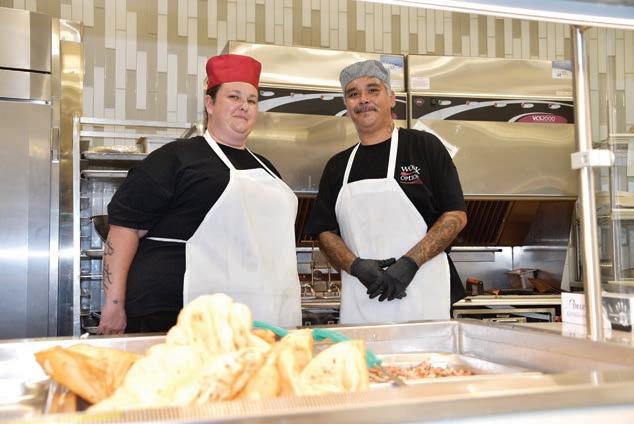
4 minute read
Adams County program o ers path to new skillsets
BY BELEN WARD BWARD@COLORADOCOMMUNITYMEDIA.COM


Finding a job isn’t always easy, but an Adams County program seeks to help those looking for a new career nd one in food service.
e Work Options program, modeled after a Denver program, o ers skills, training and counseling to help young adults get started. It’s free and workers will receive a weekly stipend.
e Work Options program started in 20-years ago in the Denver Human Services Building, the program’s main training center for over two decades.
“Adams County Human Services approached us regarding their food service operations because we operate the cafeteria in the Denver Human Services Building, and we have for over 20 years now,” said Tessa Houston, Special Projects Manager Houston said they wanted Adams County to replicate what they have been doing in Denver. Adams County Work Options program o ers a free culinary job training program.
“So we’re able to facilitate our culinary training by operating the Adams County Human Services cafeteria for the employees, and open to the public who come to our cafeteria,” Houston said.

Houston said she had been the Special Project Manager and Marketing Development for “Work Options” for about ten years.
“I started as a chef instructor and have worn a lot of di erent hats over the years. So, eventually, there was a need in marketing and development,” Houston said.
Houston said potential students start every Monday, and on the rst day, they start with the required information session to see if it’s a good t, since the program has a few requirements for students. ey complete a short application once that explanation is
“ e application is only to collect information; we don’t rule people out based on the information they provide. Once these steps are completed, they can get started as soon as possible the following week with training and get employed soon after,” Houston said.
Bus stop advertising
Jessica Ballhagen has been in the Work Options program for three weeks and is in the internship program working at the Adams County Human Services cafeteria.
While waiting for the bus, she saw an advertisement and enrolled in the program to learn new job skillset. She used to be a fourth-grade school teacher but said she stepped back for personal reasons. New skills were welcome.
“My goal is to work in a position to teach and instruct students in the culinary program. In the future own a taco truck or a business,” Ballhagen said. e culinary training is from four to six weeks and is highly individualized. Since the training is free and unpaid, the students can earn up to a $125 stipend weekly. e program calls that a cash incentive.
“A lot of our students are not in a position where they can wait six or eight weeks to become employed. So, we try to keep our programs on the shorter side, three, four weeks, get them the real basics, boot camp style,” Houston said.
Houston said that boot camp covers kitchen basics; how to read a recipe, understand basic commercial kitchen terminology and the safe handling of food.
“ en we work with them to nd the right job,” Houston said. “Just because you got a job o er that’s 40 miles away, it could take an hour on the bus to get there So that is probably not the best t. So we help you to keep looking for the right job that is actually a good t.” e program focuses heavily on employable skills as well as culinary. Its program includes a job readiness class the students take twice a week.
Getting past convictions
“We help them build a resume and practice interviewing skills. A lot of our students, in fact, over 70% of our students have some history of justice involvement. About 40 to 45% of our students have a felony on their record,” Houston said.

Houston said one topic they cover is how to discuss legal history in a job interview. Trying to become employed with a felony on their record could be a huge impediment for them, she said, and they need to approach a potential employer thoughtfully.
“We make sure they’re comfortable talking about it and talking about the changes they’ve made in their life to make sure they’re not going to get in trouble again and could hold down a job. We are very interested in helping folks who are exiting incarceration,” Houston said.
“According to data people, exiting incarceration having a support system and a job prevent them from recidivism.”
Houston said the focus is on providing the skills they need to nd a job. en, they follow up with their students monthly for the next year after completing the program.
“We make sure they to let us know if you need anything, such as resources or having issues with your employer that we can help you navigate with that sort of thing. We give them a complete support system,” she said.
Houston said they get young people, folks who had a career their whole life and something happened or looking for something new. “We have had people with professional experience, but then went to prison and now out of prison, unable to work in the eld they were working in before. So now they’re looking to do something di erent,” Houston said.
Work Options also o ers a program if a student starts a job and has di culty communicating with their employer,have to call in sick or has an emergency, car problems or a di cult situation. ey may be afraid or intimidated by their boss.
“We o er students a Mind Over Matter class. It’s a cognitive behavioral therapy class where they work with a licensed therapist or counselor to use cognitive behavioral therapy techniques to learn how to communicate better in a professional environment, “ Houston said. “It is advocating for yourself and understanding that your boss is not somebody to be afraid of or intimidated. It doesn’t mean you’re a failure, or it’s the end of the world.”
Houston said a large percentage of their students are either unhoused or in an unstable housing situation and many have trouble nding childcare. ose are situations that prevent them from being able to work, so the program helps them learn to navigate those issues as well as concerns about health care or drug and alcohol.
“We have 130 community partners that we work with and other nonprofits and agencies around the Denver Metro area, to help our students, “ Houston said.
Internships begin
After students nish the program, they could get hired by “Work Options” as temporary paid interns at the cafeteria. Also, they o er an apprenticeship that is part of the National Restaurant Association’s program.
“ is is a nine-month program, where they end up with an accredited apprenticeship certi cate which is huge,” Houston said. “A lot of our folks, don’t have any educational credentials. So throughout our core program, our students have the opportunity to earn up to 10 industry-recognized certi cations.”
With the “Work Options” program, the goal is to make sure students are







